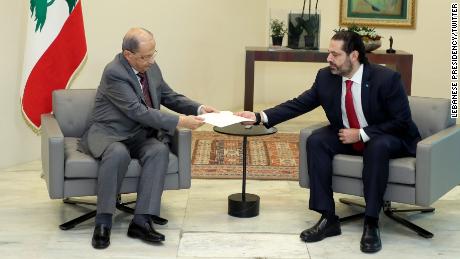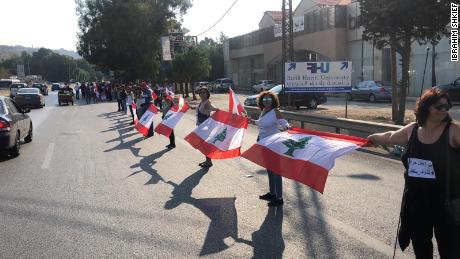Protests toppled two governments in three days, but the fight is only beginning

Then, in the span of just three days this week, governments in Iraq and Lebanon have agreed to resign. Protesters have rejoiced, but many also recognize that a long and complicated road lies ahead.Unlike much of the Arab world, Iraq and Lebanon are not ruled by autocrats, and a change in government rarely spurs a shift in domestic policies. Instead, demonstrators say these countries are governed by democratically-elected kleptocracies, with the political elite deeply entrenched thanks to convoluted sectarian power-sharing systems.In both cases, protesters face the formidable task of changing entire political systems, and not just their cabinets, to tackle their grievances.This became clear in Lebanon when, no more than 24 hours after resigning as prime minister, Saad Hariri was already emerging as a favorite for the same post. In Iraq, Prime Minister Adil Abdul Mahdi's resignation will be effective only when a successor is found."To the Iraqi protesters, the resignation (of Abdul Mahdi) in some parts is a welcome move in terms of the protests yielding some sort of result," said Amnesty International's Iraq researcher Razaw Salihy. "But it's nowhere near enough in terms of the demands that protesters have.""(These are) not only the resignation, but also that everybody in government be held accountable for long-standing human rights violations as well as … very deep corruption in government," said Salihy.In an interview with CNN's Becky Anderson, Interior Minister for Lebanon's caretaker government and Hariri ally, Raya al-Hassan, also acknowledged the Lebanese government's resignation as only "a partial victory.""I think this is a portion of what they were demanding," Hassan said. "Definitely we need a clean government. The protesters have set the bar very high for us, so we cannot anymore try to weasel our way out of that commitment." But even if politicians have sincerely committed themselves to eradicating corruption — and there is a deep distrust among protesters about this — the circumstances may prove intractable. Among the main hurdles is the political system that both countries have in common.After the 2003 American invasion deposed Iraq's long-time dictator Saddam Hussein, the US introduced confessionalism — the same colonial-era system imposed in Lebanon — which divides power based on sectarian affiliation. Protesters in both countries point to it as the root cause of endemic corruption and cronyism. Another complicating factor is Iran's growing influence. In Iraq, the Tehran-backed Popular Mobilization Units (PMUs) played a major role in expelling ISIS from the country, but came to wield great power in government. In Lebanon, Hezbollah — the Iranian-backed political and militant group — mounted a guerrilla campaign which eventually saw Israel make a messy withdrawal from south Lebanon after 18 years of occupation. It later built a political coalition, comprised of Christian and Shia allies, into the country's strongest political force.
But even if politicians have sincerely committed themselves to eradicating corruption — and there is a deep distrust among protesters about this — the circumstances may prove intractable. Among the main hurdles is the political system that both countries have in common.After the 2003 American invasion deposed Iraq's long-time dictator Saddam Hussein, the US introduced confessionalism — the same colonial-era system imposed in Lebanon — which divides power based on sectarian affiliation. Protesters in both countries point to it as the root cause of endemic corruption and cronyism. Another complicating factor is Iran's growing influence. In Iraq, the Tehran-backed Popular Mobilization Units (PMUs) played a major role in expelling ISIS from the country, but came to wield great power in government. In Lebanon, Hezbollah — the Iranian-backed political and militant group — mounted a guerrilla campaign which eventually saw Israel make a messy withdrawal from south Lebanon after 18 years of occupation. It later built a political coalition, comprised of Christian and Shia allies, into the country's strongest political force. Iran didn't create the status quo that people rose up against in either country, but it has a great stake in maintaining it. And protesters galvanized by deep economic grievances that accumulated over many years of government mismanagement soon found themselves facing off with Iranian-backed forces, or their supporters.In Lebanon, Hezbollah initially acknowledged the protests, which began in mid-October, as legitimate, but later tried to discredit the movement, saying parts of it were driven by a conspiracy against the group.Supporters of Hezbollah and its political allies in the Amal movement have twice attacked protest sites. The group has also opposed the resignation of Hariri's national unity government, which included Hezbollah and its allies.Hezbollah's stance has drawn the ire of protesters, even among those most sympathetic to the group. While not itself notorious for economic corruption, Hezbollah has positioned itself, at this critical moment, as the guardian of Lebanon's self-serving establishment.When the demonstrations began in Iraq in early October, there was "very little talk of the downfall of the regime," said Amnesty's Salihy, but the security forces' violent response to the protests fomented political discontent."The presence of certain factions of the Popular Mobilization Units in southern governorates, where they rule with anRead More – Source
Iran didn't create the status quo that people rose up against in either country, but it has a great stake in maintaining it. And protesters galvanized by deep economic grievances that accumulated over many years of government mismanagement soon found themselves facing off with Iranian-backed forces, or their supporters.In Lebanon, Hezbollah initially acknowledged the protests, which began in mid-October, as legitimate, but later tried to discredit the movement, saying parts of it were driven by a conspiracy against the group.Supporters of Hezbollah and its political allies in the Amal movement have twice attacked protest sites. The group has also opposed the resignation of Hariri's national unity government, which included Hezbollah and its allies.Hezbollah's stance has drawn the ire of protesters, even among those most sympathetic to the group. While not itself notorious for economic corruption, Hezbollah has positioned itself, at this critical moment, as the guardian of Lebanon's self-serving establishment.When the demonstrations began in Iraq in early October, there was "very little talk of the downfall of the regime," said Amnesty's Salihy, but the security forces' violent response to the protests fomented political discontent."The presence of certain factions of the Popular Mobilization Units in southern governorates, where they rule with anRead More – Source




